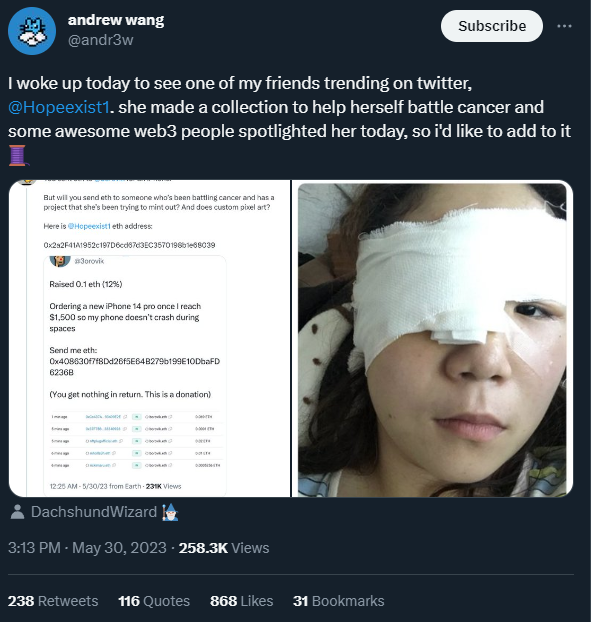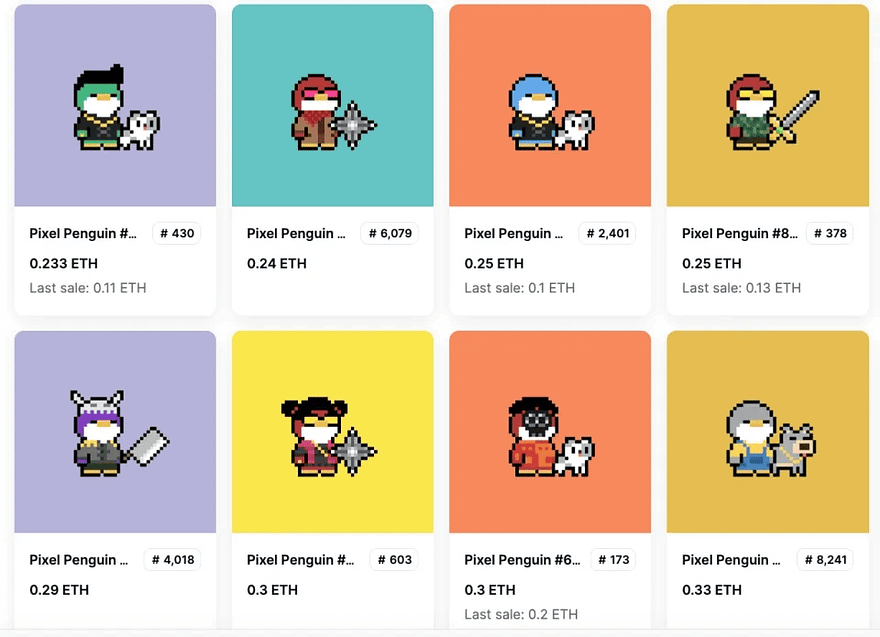Dark Side of Influencer-Backed NFT Projects: Pixel Penguins Scandal

In a realm known for its innovation and creativity, the NFT community was jolted by a seismic event in the past few months. These had seen a decline in NFT art sales, coupled with the rise of speculative crypto memecoins and instances of solicitation for funds without a clear purpose. These events had cast a shadow over the Web3 landscape, leaving artists and collectors disillusioned with the direction it was taking. Amidst this uncertainty, a ray of hope emerged when NFT influencer Andrew Wang took to Twitter to rally support for a fellow artist facing a personal battle.
Wang’s tweets below, resonating with his audience of nearly 200,000, revealed that Sarah, a Chinese pixel artist known as hopeexist, had created a Pixel Penguins NFT collection to fund her fight against lacrimal gland cancer. The collection garnered attention and backing from influential figures, offering a beacon of positivity within a troubled climate.
However, the optimism was short-lived. In a matter of hours, hopeexist’s NFT project disappeared, along with $117,000 in funds, as they were stealthily rerouted to new blockchain addresses. This audacious rug-pull scam left the Web3 community grappling with shock and disbelief, an unforeseen betrayal within its midst.
The Deception
What set the Pixel Penguins scam apart was the elaborate level of trust it cultivated among seasoned NFT participants. Andrew Wang’s previous interactions with hopeexist over the course of 2022 lent an air of authenticity to the endorsement. This sophisticated approach of building connections before executing the rug-pull was an unprecedented maneuver, revealing the extent of the deception’s complexity.
A Screenshot of Wang’s Tweets
Facing backlash and confusion, Wang addressed the situation transparently in a Twitter Space. He owned up to his lack of thorough research and extended apologies to anyone who had placed trust in his promotion.
This incident spotlighted the challenge of validating artists and their work in a landscape where intentions can be masked and trust can be easily exploited.
The Rise of Pixel Penguins
In the spring of 2023, Pixel Penguins took the NFT world by storm, presenting itself as a groundbreaking project combining art, collectibles, and charity. Armed with a masterfully orchestrated marketing campaign, the project instantly won the hearts of crypto enthusiasts.
The secret to its swift ascent? The unwavering backing of social media influencers who lent their credibility and massive followings to the cause.
Pixel Penguins on OpenSea
At the core of Pixel Penguins’ allure was its promise to support various charitable causes with a percentage of the proceeds from NFT sales. The narrative resonated deeply with a generation eager to make a positive impact while engaging in the digital art craze. Influencers, leveraging their influence and persuasive prowess, painted a picture of genuine altruism and charitable intent.
As Pixel Penguins soared to unprecedented heights, doubts began to creep into the minds of discerning crypto enthusiasts. Investigative voices surfaced, questioning the veracity of the charitable contributions and the project’s overall transparency. A deep dive into the blockchain revealed a labyrinth of obscured transactions and questionable handling of funds, casting an ominous shadow over the once-promising venture.
Navigating Uncertainty
In the wake of the Pixel Penguins scam, the Web3 space is at a crossroads. The inherent duality of decentralization that empowers NFTs also exposes them to vulnerabilities exploited by scams. As the community grapples with this complex reality, participants must weigh whether to continue traversing the Web3 landscape. Distinguishing between authenticity and deceit becomes paramount, as individuals redefine their roles within a space that oscillates between promise and peril.
The journey ahead remains uncharted, but the heart of Web3 beats on. As the community evolves, strategies to discern truth from falsehood will grow too. The Web3 narrative will be shaped by its participants, who hold the power to redefine its trajectory. Through the uncertainties, the Web3 community strives to build a legacy of innovation, authenticity, and resilience that endures despite the challenges that lie ahead.
In the fast-paced world of cryptocurrency, NFTs have revolutionized digital ownership, captivating enthusiasts and investors alike. However, with the surge in popularity comes a shadowy underbelly, epitomized by the notorious case of Pixel Penguins — an NFT charity scam that has underscored the perils of unchecked influencer culture within the NFT space.
This exposé delves into the deceptive journey of Pixel Penguins, revealing the potential dangers when influencer endorsements are driven more by profit than authenticity.
Trust Shattered and Lessons Learned
The Pixel Penguins scandal sent shockwaves through the NFT community, leaving a trail of betrayed investors and disillusioned followers. The deception not only undermined the trust of individuals directly involved but also cast doubt on the broader integrity of the NFT space. The aftermath of this debacle served as a sobering reminder of the consequences when influencer-driven projects prioritize profit over authenticity.
The Pixel Penguins fiasco underscored the imperative of responsible influence within the NFT ecosystem. Social media influencers, wielding considerable power and persuasion, have a moral obligation to carefully vet the projects they endorse. Genuine enthusiasm for a cause must be coupled with diligent research to ensure that the initiatives they support uphold transparency and deliver on their promises.
Pixel Penguins serves as a cautionary tale — a vivid reminder that the NFT world, while brimming with potential, demands vigilance against the dark undercurrents of influencer-driven scams. Investors, collectors, and influencers must unite to create a culture of integrity, where authenticity and transparency reign supreme. Only through collective responsibility can the NFT space flourish as a realm of genuine innovation and positive change, free from deception and exploitation.








Reviews